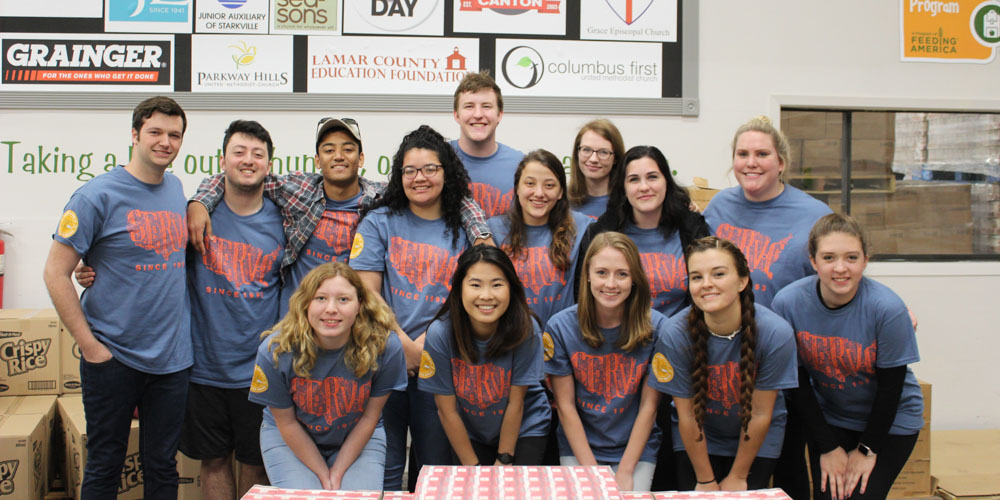Written by Xylina Marshall, Communications Coordinator for the Honors and Scholars Programs
For the past twenty-five years, UT students of diverse backgrounds, majors, and campus involvement have engaged in service outreach, traveling to various communities in the U.S. through the Alternative Break Program. Managed by the Center for Leadership and Service (CLS), these trips have become a hallmark of the volunteer opportunities offered by the university. Since its inception, the Alternative Break Program has attracted large numbers of honors students as both leaders and participants. In 2017, Honors & Scholars formalized this relationship by partnering with CLS to create the Honors Alternative Spring Break Trip. 
To date, our students have successfully led two honors-exclusive trips focusing on food insecurity and participated in many other alternative break opportunities. By combining social responsibility and community engagement—two hallmarks of Honors & Scholars, Alternative Breaks enable our students to take their honors experience beyond the classroom and campus to the greater community. We are excited to announce that beginning in 2018-2019, honors and scholars students will have the opportunity to participate in both a fall and spring Honors Alternative Break trip. Read about the experiences of honors students on Alternative Break trips in this article written by a 2017 trip leader, on the Honors Leadership blog, and in the excerpt below by one of the participants on the 2018 Honors Alternative Spring Break.
“This past March, I participated in the Honors Alternative Spring Break trip with a focus on Food Insecurity & Public Health in Jackson, Mississippi. In a week, I became thoroughly invested in the topic as well as in the group of students who had also committed their week to service. Although we developed a semblance of understanding of the focus of our trip in pre-trip conversations, it was not until we were able to couple that theoretical framework with service experiences that we understood the multi-faceted nature of food insecurity. We learned from and interacted with folks in both the Jackson community that are directly affected by food insecurity as well as the local organizations that are constantly working to uplift their community.
Some of these local organizations worked directly with those experiencing food insecurity and others worked on shifting some of the structural components that perpetuate the issues. We learned about agriculture from a community permaculture garden and a local farm—both of which had goals of educating and sustaining the local community and providing opportunities for people to grow their own produce. We worked in the warehouse of the primary food bank in Mississippi, Mississippi Food Network, packing meals for children across the state who may otherwise not have food on the weekends. We also worked with a Meals on Wheels program, delivering meals to homebound citizens who are isolated in rural areas and have limited access to food.
These service experiences, in addition to many more, allowed me to ground the topic of food insecurity in the people I met; in the nonprofit employees who work tirelessly for the betterment of their community, in the business owners who adopt a socially responsible model of giving back to their community, and in the people experiencing food insecurity who rely on the support of these organizations. Further, the service trip opened my mind to the experience of folks in a community that I don’t usually interact with, and I was able to come away from the trip with first-hand experience of the injustices that afflict those experiencing food insecurity. I have become more empathetic and educated, and can serve as a better ally to that community in the future.” – Maya Bian, Class of 2020

 Some of these local organizations worked directly with those experiencing food insecurity and others worked on shifting some of the structural components that perpetuate the issues. We learned about agriculture from a community permaculture garden and a local farm—both of which had goals of educating and sustaining the local community and providing opportunities for people to grow their own produce. We worked in the warehouse of the primary food bank in Mississippi, Mississippi Food Network, packing meals for children across the state who may otherwise not have food on the weekends. We also worked with a Meals on Wheels program, delivering meals to homebound citizens who are isolated in rural areas and have limited access to food.
Some of these local organizations worked directly with those experiencing food insecurity and others worked on shifting some of the structural components that perpetuate the issues. We learned about agriculture from a community permaculture garden and a local farm—both of which had goals of educating and sustaining the local community and providing opportunities for people to grow their own produce. We worked in the warehouse of the primary food bank in Mississippi, Mississippi Food Network, packing meals for children across the state who may otherwise not have food on the weekends. We also worked with a Meals on Wheels program, delivering meals to homebound citizens who are isolated in rural areas and have limited access to food.